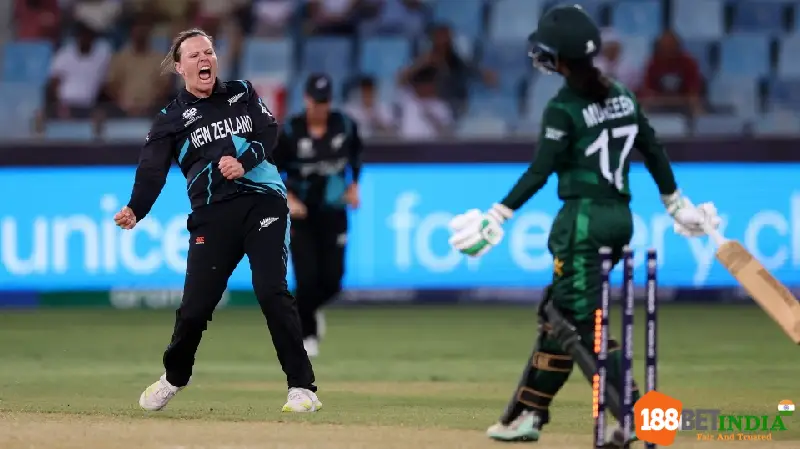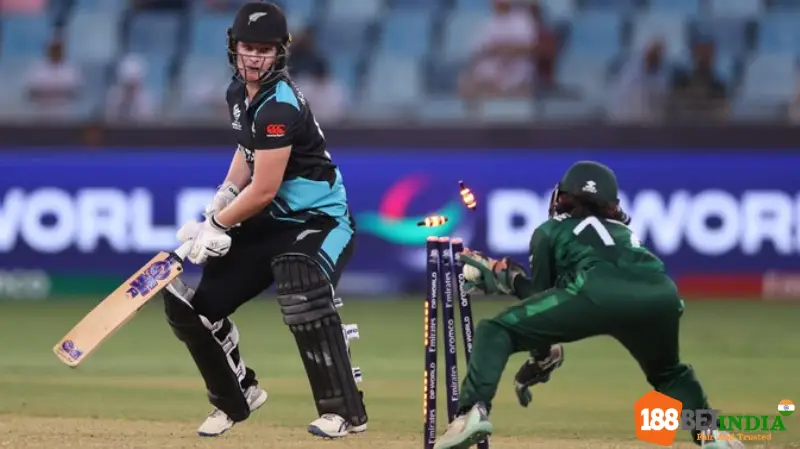
Pakistan’s Collapse vs New Zealand: A Wake-Up Call for a New Batting Order
The New Zealand women vs Pakistan women match in the Women’s T20 World Cup ended in disappointment for Pakistan, as they suffered a crushing 56-all-out defeat. This performance has not only eliminated Pakistan from the tournament but also forced the team management to confront some hard truths about their batting woes. Coach Mohammad Wasim did not mince words, emphasizing the urgent need for fresh talent and a shift in mindset to elevate Pakistan’s game.
New Zealand’s Commanding Performance: A Lesson in Excellence
The White Ferns, opting to bowl first, dismantled Pakistan’s batting lineup with clinical precision. Kamindu Mendis and Charith Asalanka tried to keep Pakistan afloat, but it wasn’t enough to avoid a devastating collapse. Megan Schutt and Amelia Kerr led the charge with the ball, making sure Pakistan had no breathing room. Chasing a modest target of 57, New Zealand cruised to victory with eight wickets in hand, leaving Pakistan’s semi-final dreams in shambles.
Pakistan’s Batting: Time for a Complete Overhaul
Pakistan’s dismal exit from the tournament has reignited the discussion around the need to rebuild their batting unit. Coach Wasim was candid in his post-match interview, acknowledging that Pakistan’s batting strategy has not worked for some time.
“We’ve seen glimpses of potential, but it’s time to move on. The seniors must step up, but we also need fresh faces to bring energy into the team,” Wasim stated.
Players like Nida Dar, who has struggled for consistency, may face the axe. Dar, along with Sidra Amin and Iram Javed, has failed to perform at crucial moments.
Domestic Cricket and Youth Development: Pakistan’s Hope for the Future
The silver lining for Pakistan lies in their domestic cricket structure. With recent U-19 tournaments showcasing emerging talent, the Pakistan Cricket Board (PCB) hopes to integrate these young players into the national side. Wasim remains optimistic:
“We have several promising players from our domestic circuit. It’s not about lacking talent, but about giving opportunities to those who deserve it.”
Pakistan’s focus will now shift to preparing for the ODI World Cup qualifiers, where they must finish in the top two of a six-team tournament to secure their spot.
Similar Struggles for Bangladesh and Sri Lanka
Interestingly, Bangladesh and Sri Lanka are facing similar batting issues. Despite entering the tournament with high hopes, both teams failed to deliver consistent performances. Bangladesh’s captain Nigar Sultana emphasized the need to stay positive:
“We need to win at least five out of six matches to qualify automatically for the ODI World Cup. Our batting must improve.”
Meanwhile, Sri Lanka’s poor performances, despite their recent success in bilateral series, have left coach Rumesh Ratnayake searching for answers.
Key Performances in the New Zealand vs Pakistan Clash
- New Zealand Batting: Georgia Plimmer’s 53 off 44 balls provided the perfect foundation for the run chase.
- Pakistan Batting: Nida Dar, Sidra Amin, and Iram Javed struggled, continuing their poor run of form.
- Bowling Heroes: Megan Schutt and Amelia Kerr were instrumental in restricting Pakistan to just 56.

FAQs
Pakistan’s batting was the main issue. Their top-order collapse left them with no chance of posting a competitive total.
New Zealand’s bowlers, led by Megan Schutt, dismantled Pakistan’s lineup, and their batters comfortably chased the target with eight wickets in hand.
Coach Wasim hinted at introducing fresh talent and possibly dropping underperforming seniors like Nida Dar and Sidra Amin.
Both teams are focusing on improving their batting to secure direct qualification for the ODI World Cup.
The focus will shift to domestic competitions and preparing for the ODI World Cup qualifiers, where Pakistan must perform well to secure a spot in the tournament.

Conclusion
The New Zealand women vs Pakistan women match exposed the vulnerabilities in Pakistan’s batting strategy. With a painful group-stage exit, Pakistan must now regroup, re-evaluate their approach, and nurture new talent from their domestic circuit. This loss may be the wake-up call they need to finally address the issues that have plagued them in recent tournaments.
As Pakistan, Bangladesh, and Sri Lanka battle similar challenges, the journey to the ODI World Cup becomes more intense. For Pakistan, the path forward is clear: it’s time for a youthful reboot. Whether this change will bear fruit remains to be seen, but one thing is certain—the next few months will be crucial for Pakistan’s cricketing future.
